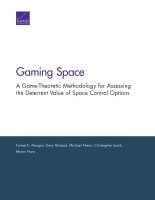| 来源类型 | Research Reports
|
| 规范类型 | 报告
|
| DOI | https://doi.org/10.7249/RR694
|
| ISBN | 9780833097903
|
| 来源ID | RR-694-AF
|
| Gaming Space: A Game-Theoretic Methodology for Assessing the Deterrent Value of Space Control Options |
| Forrest E. Morgan; Gary W. McLeod; Michael Nixon; Christopher Lynch; Myron Hura
|
| 发表日期 | 2018
|
| 出版年 | 2018
|
| 页码 | 92
|
| 语种 | 英语
|
| 结论 |
- The game-theoretic methodology provides a broad framework for assessing the potential effects of alternative offensive space control (OSC) and defensive space control (DSC) systems.
- There are four types of analysis in which the game-theoretic methodology can be applied through a variety of space deterrence and escalation management-related questions.
- In the first type, analysts apply the process in a dynamic strategic assessment to identify what OSC and DSC options would likely be most attractive to belligerents on each side of a confrontation, thereby anticipating potential paths of conflict and escalation in space.
- The second type consists of a threat-driven assessment in which analysts evaluate a particular OSC option to determine the most effective DSC counters within acceptable levels of escalation risk and political cost.
- The third type consists of a technology-driven assessment of particular DSC options that U.S. leaders might be contemplating to evaluate their merits and determine whether opponents might be able to easily counter those defenses.
- Finally, the analytical process can also be used in reverse to do a Blue OSC assessment to identify the most effective, least escalatory, and least politically costly ways to attack enemy space capabilities.
- Each type of analysis would result in one of several outcomes: the emergence of a dominant strategy for one side or the other; a saddle point in which one side or the other would have effective OSC or DSC options at its disposal, but with very high escalation risks, political costs, or both; or an indeterminate draw for both sides.
|
| 摘要 |
Support for Program Development Decisions- Make the Defense Space Analysis Tool (DSPAT) available to selected system program offices and agencies involved in national security space system research and development, and encourage them to learn and apply the game-theoretic methodology.
- Insist upon thorough, method-based analysis in briefings and papers advocating the development of any OSC or DSC system.
Support for Operational Training and Tactical Decisionmaking- Make the DSPAT available to the Joint Space Operations Center (JSpOC) and selected Air Force space operations centers.
- Incorporate use of the game-theoretic methodology in the JSpOC Mission System (JMS) and other operational decisionmaking tools and procedures there and at Air Force space operations centers.
- Develop a comprehensive Master Game Table (MGT) and incorporate information from it in training programs at Air Force space operations units and centers, and train crew commanders on the employment of method-based analysis.
Support for Space Play in War Games- Make the game-theoretic methodology and supporting tools available to Air Force, Joint, and OSD war game developers.
- Encourage war game developers and controllers to make the DSPAT available to players.
- Use the game-theoretic methodology and supporting tools to support space event adjudication in major war games.
Support for Strategic Planning and Policymaking- Make the game-theoretic methodology and supporting tools available to Air Force and Joint planners, space policymakers in OSD, and other space-related planning and policymaking offices.
- Conduct systematic, comprehensive dynamic strategic assessments to determine likely paths of conflict in space in all defense planning scenarios and other scenarios of interest.
|
| 主题 | Cyber Warfare
; Satellites
; Space Warfare
; United States Air Force
; Wargaming
|
| URL | https://www.rand.org/pubs/research_reports/RR694.html
|
| 来源智库 | RAND Corporation (United States)
|
| 引用统计 |
|
| 资源类型 | 智库出版物
|
| 条目标识符 | http://119.78.100.153/handle/2XGU8XDN/108710
|
推荐引用方式
GB/T 7714 |
Forrest E. Morgan,Gary W. McLeod,Michael Nixon,et al. Gaming Space: A Game-Theoretic Methodology for Assessing the Deterrent Value of Space Control Options. 2018.
|
|
文件名:
|
x1515077080959.jpg
|
|
格式:
|
JPEG
|

|
文件名:
|
RAND_RR694.pdf
|
|
格式:
|
Adobe PDF
|
除非特别说明,本系统中所有内容都受版权保护,并保留所有权利。